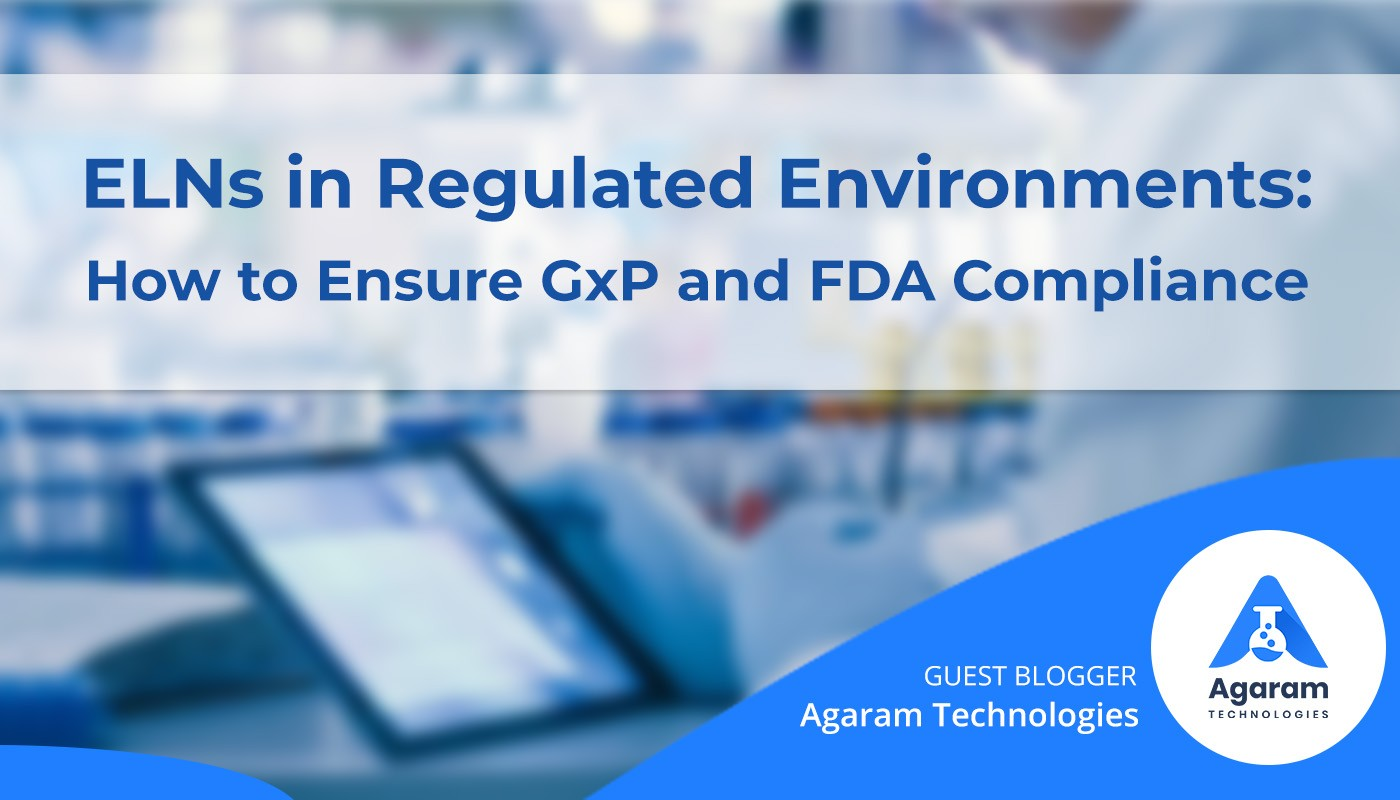Agaram Technologies is a seasoned pioneer in the realm of laboratory informatics, earning its reputation as a leading provider of enterprise-class software products for laboratories and analytical instrumentation manufacturers across the globe. Agaram offers a range of feature-rich, flexible digital solutions such as Qualis LIMS, Logilab ELN, and Logilab SDMS that help laboratories streamline data management, achieve regulatory compliance, stay audit ready, and optimize overall operational performance.
_____
Electronic Lab Notebooks (ELN) are redefining the way labs handle data by replacing traditional paper notebooks with enhanced digital solutions. As regulatory requirements continue to evolve, the need for reliable and compliant data management has never been greater.
In this blog, we’ll break down the key regulatory requirements and dive into how Electronic Lab Notebooks (ELNs) can help labs achieve regulatory compliance, enhance data integrity, and always stay audit ready.
Understanding Compliance: Core Standards for Regulated Laboratories
In today’s highly regulated environment, laboratories must navigate a complex and evolving compliance landscape to ensure the accuracy and integrity of their work. Staying aligned with key regulatory standards is not only essential for legal reasons but also for maintaining credibility with stakeholders and ensuring the quality of scientific outcomes.
To fully understand how ELNs support compliance, it’s important to first explore the key regulatory frameworks that govern laboratory operations in specific industries.
FDA Regulations
The United States Food and Drug Administration (U.S. FDA) is a federal agency of the Department of Health and Human Services, which is responsible for protecting and promoting public health. The agency establishes regulations and guidelines that manufacturers must follow to maintain compliance throughout the product's lifecycle. These regulations play a crucial role in guiding laboratories to maintain data integrity, traceability, and quality throughout their operations.
GxP Guidelines
GxP refers to the good practice guidelines and regulations created to ensure that food, medical devices, drugs, and other life science products are safe, effective, and usable. The X in GxP is a placeholder for one of several disciplines such as GMP (Good Manufacturing Practice), GCP (Good Clinical Practice), or GLP (Good Laboratory Practice). They define the various ways companies in regulated industries are required to control their processes and procedures to ensure consistency and quality in their products.
21 CFR Part 11
Title 21 Part 11 of the U.S. Code of Federal Regulations outlines the FDA’s requirements for electronic records and electronic signatures, ensuring they are trustworthy, reliable, and equivalent to paper records. Labs using ELNs must demonstrate system validation, audit trails, access control, and secure signatures. 21 CFR Part 11 applies to all FDA-regulated industry entities that choose to maintain records in digital formats, including pharmaceuticals, biotechnology, medical devices, and clinical labs.
ALCOA+ Data Integrity Principles
The ALCOA principles are a set of data integrity guidelines that form the foundation for ensuring the reliability and trustworthiness of data in regulatory environments, particularly in industries such as healthcare, life science, pharmaceutical, biotechnology, etc.
ALCOA is an acronym for the original five principles of data integrity. Those principles are:
- Attributable
- Legible
- Contemporaneous
- Original
- Accurate
ALCOA+ expands this to ensure that data is also complete, consistent, enduring, and available.
Common Compliance Challenges Regulated Labs Face Without ELNs
Running a lab without an ELN presents numerous issues that can impact regulatory adherence, data accuracy, and lab efficiency. These obstacles not only slow the lab’s day-to-day operations but also create risks when it comes to audits, collaboration, and securing sensitive information.
Five common compliance challenges are:
1. Paper-Based/Manual Data Entry Errors
Manual data entry in paper-based systems is time-consuming and prone to human error, often resulting in inaccuracies. Paper records are vulnerable to physical damage or loss, posing serious risks to data security and regulatory compliance.
Webinar CTA: Paperless and Beyond: Jump Start Your ELN Implementation
2. Inconsistent Documentation Practices Across Teams
Different teams may use varied data entry styles or tools to manage information, resulting in fragmented records that are difficult to share and that hinder collaboration. Without standardized documentation practices, labs risk miscommunication, delays in reporting, and noncompliance during audits, which can compromise the credibility and reliability of their work.
3. Difficulty Tracking Changes Over Time
In regulated labs, the inability to track when changes were made creates gaps in data integrity and traceability. This lack of clear version control makes it challenging to verify records and maintain consistent documentation throughout the project lifecycle.
4. Lack of Evidence During Audits — Who Did What, When, and Why?
Auditors require a clear trail of user actions. Without detailed logs of user actions, labs find it difficult to demonstrate accountability and procedural adherence. This absence of traceability complicates audits and raises questions about the authenticity and reliability of records.
5. Lack of Controlled Access to Data
Paper-based systems or unsecured files do not allow for proper access control. Limited or no restrictions on who can view or edit records increase the risk of unauthorized changes or data breaches. This compromises data security and raises concerns about the protection of sensitive information and overall compliance.
How ELNs Help Labs Stay Compliant in Regulated Environments
In today’s ever-changing regulated landscape, Electronic Lab Notebooks (ELN s) are a vital tool in maintaining data integrity, improving operational efficiency, and ensuring audit readiness.
The following eight points highlight how ELNs contribute to a more compliant lab environment:
- Centralized, Standardized Data Capture
ELNs form a unified repository for all experimental data, ensuring consistency across the lab. They offer a centralized platform where data is recorded, captured, and stored in a structured format, organizing information and making it easily accessible.
- Template-driven Data Entry
Predefined sheet and protocol templates in ELNs with field-based data capture help standardize data entry, ensuring users capture required information accurately and completely.
- Controlled Access to Data
An ELN’s robust user management features and role-based permissions restrict data access to authorized personnel only, safeguarding sensitive information and ensuring compliance with privacy standards.
- Electronic Signatures
ELNs enable secure electronic signatures for the approval and verification of data at each stage of experiments and tasks by assigned users. This functionality is crucial for ensuring regulatory compliance and maintaining audit readiness.
- Workflow Automation
ELNs streamline routine processes by automating workflows that align with your lab’s standard operating procedures, minimize manual errors, support effective team management, and ensure that critical steps are consistently followed throughout the research and documentation process.
- Version Control
By tracking modifications made to data and maintaining version histories, ELNs allow labs to monitor data evolution over time. Every change made to a record is tracked effortlessly, enabling complete transparency and preventing unauthorized edits.
- Audit Trails
ELNs maintain date- and time-stamped records of all user and system-generated actions, providing comprehensive audit logs that facilitate accountability and traceability.
- Secure Cloud-based Storage
Cloud-based ELNs provide secure, backed-up data storage that protects against loss or damage, while enabling access to the data anytime, anywhere.
White Paper CTA: Is a Cloud, On Premise, or Hybrid ELN the Right Solution for You?
Be Audit Ready with ELN
Audits can be stressful, especially when documentation is scattered or incomplete. ELNs simplify audit preparation by:
- Maintaining complete audit trails of user actions.
- Ensuring every data change is attributed and time stamped.
- Allowing instant retrieval of documents and workflows.
- Demonstrating system validation and electronic signature compliance.
With an ELN in place, labs can confidently face regulatory inspections knowing that data is traceable, secure, and compliant.
Choose the Right ELN for Your Regulated Lab
When looking for the best ELN for regulated laboratories, consider these key questions:
- Does it help your lab adhere to 21 CFR Part 11 (or other local regulations) and GxP compliance?
- Does it have user access controls and comprehensive audit trails in place to ensure accountability?
- Can it support standard operating procedures (SOPs), templates, and workflows that align with regulatory requirements to ensure consistency and traceability?
- Is it scalable and secure enough for your organization’s growth?
By carefully evaluating these factors, you can select an ELN that not only meets your current regulatory needs but also supports your lab’s future growth and evolving compliance requirements.
One such ELN that can satisfy all these requirements and more is Agaram Technologies’ Logilab ELN. Trusted by laboratories across the world, Logilab ELN combines cutting-edge technology with user-friendly design to elevate every lab’s performance.
_____
See Logilab ELN in action and discover how it can check every box for your lab with a personalized demo. You can also experience the power of standardized yet flexible data capture and improved data reliability firsthand with the free version of Logilab ELN — go register now and see the difference yourself!




Comments